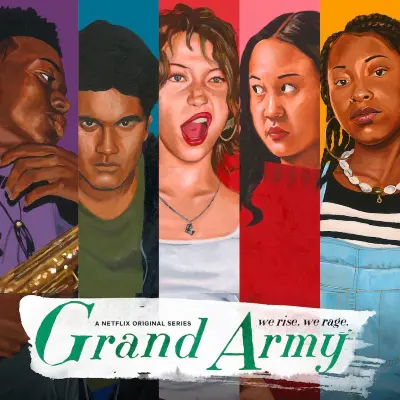Netflix teen drama Grand Army is trying to do too much with "trauma porn" as it tries to imitate Euphoria
-

"What do a Chinese adoptee with white Jewish parents, a closeted Indian-American Harvard hopeful, a Haitian-American first generation college applicant and a white Free the Nipple activist have in common?" says Jude Dry. "They all exist in the same universe in Grand Army, a soapy teen melodrama set at a Brooklyn public high school. With a plot that includes bomb threats, sexual assault, Green Card marriages, and the school-to-prison pipeline, Netflix’s not-so-thinly-veiled attempt to compete with HBO’s Euphoria is all over the place. Controversy began swirling around the series in early September, when a former writer alleged racism in the writers’ room on Twitter after Netflix released a first trailer. While showrunner and creator Katie Cappiello has yet to respond to the allegations, the obvious missteps of the show speak for itself. Despite a blatant play at relevance by filling out an inclusive ensemble, Grand Army cannot help but center its white girl protagonist. The result is a dizzying mish-mosh of half-baked stories that is light on meaningful character development and long on tired cliches about people of color. Grand Army is so eager to represent Gen Z one can feel the elder Millennial writers foaming at the mouth in every frame."
ALSO:
- Grand Army is bracingly honest in its look at teen sexuality and the challenges that come with trying to carve out an identity in an Instagram world: "But where Euphoria takes big swings with its imagery and sidebars into surreality, Grand Army sticks, for the most part, to stripped-down reality," says Jen Chaney. "While Euphoria has a glittery, glossy patina, many scenes in Grand Army, even ones that take place outdoors, seem to be unfolding under the flat overhead lights of a high-school hallway. As fantastic as Euphoria can be, it never lets you forget you’re watching a TV show, whereas Grand Army, at times, does."
- Watching Grand Army can feel like experiencing adolescence itself: "High-energy, full of itself and busy pulling in everything it can find from the outside world to try on, keep or discard, in a mad flurry of excitement," says Lucy Mangan. "It’s a wild, confused and compelling ride all at once."
- Grand Army doesn’t offer anything new to the teen genre at this point: "Not in its depiction of sexual assault, not in its depiction of teenage slut-shaming and cyberbullying, not in its depiction of a 'seemingly normal' high school student being capable of horrifying things, not in its depiction of a closeted gay teen story, and especially not in its depiction of the struggles (upon struggles, upon struggles) of Black students," says LaToya Ferguson. "That’s not even necessarily an indictment of Grand Army, as plenty of teen dramas have successfully existed without reinventing the wheel."
- Grand Army gets bogged down by extraneous storylines and buzzwords
- Grand Army finds its heart in its remarkably talented teenage actors Amalia Yoo, Odessa A’zion and Odley Jean
TOPICS: Grand Army, Netflix, Amalia Yoo, Katie Cappiello, Odessa A’zion, Odley Jean, Teen TV
